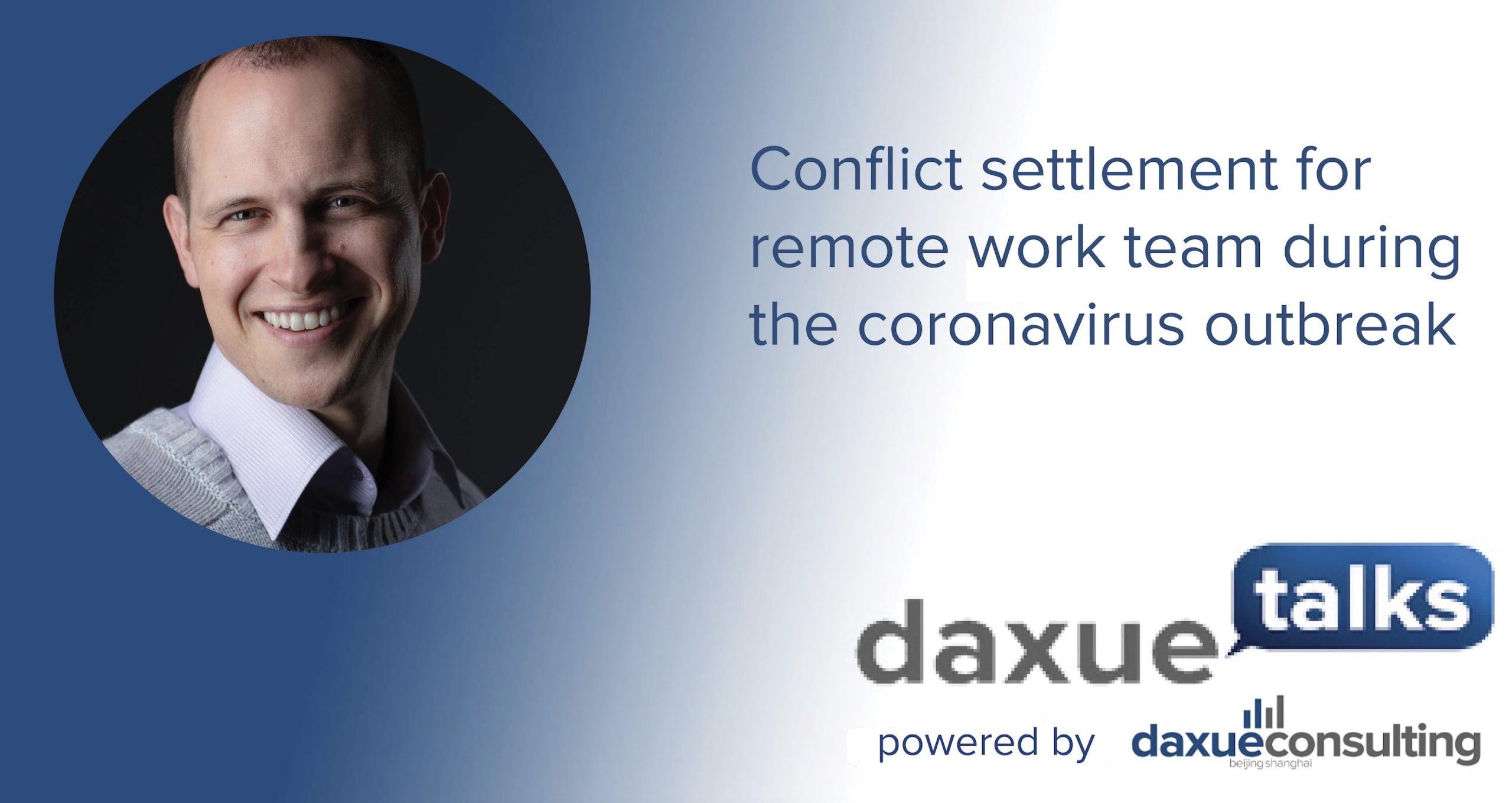Daxue Talks transcript #48: Conflict settlement for remote work team during the coronavirus outbreak
In this episode of Daxue Talks David Ammerschlaeger, a psychologist and the head of psychology at ChingHo clinic, talks about conflict settlement for remote work teams during the coronavirus outbreak.
Full transcript below:
Welcome to Daxue Talks, a show powered by Daxue Consulting, a China-based strategic market research company founded in 2010.
My name is David Ammerschlaeger, I am a psychologist and I am the head of psychology at ChingHo clinic. I am also an executive coach and a member of the shanghai international mental health association and the British Psychological Society and I am very happy to be here tonight.
What conflict management techniques exist that can be applied in a crisis situation?
There are many models in conflict management. I am not going to go into the specific models because that would be a really long discussion, there is a lot of training and coaching out there as well and in the end, it’s important to adapt I think the right response to the specific situation, the culture of the people, the organizational setting and each person’s personality. So, there is no easy answer to that basically. Most of these models analyze individual or collective responses to conflict and these include options like inaction, withdrawal, capitulation, domination through physical or psychological means, the clarification of goals, the involvement of stakeholders, negotiation, mediation – I mean there’s so much that you can find and that’s more or less complicated models.
At the individual level, I would say the opposing behaviors of the two parties are split between cooperation and assertiveness and that’s actually fundamentally the question, how much you accept to bear of the specific behavior and what I have seen in my practice is that often it’s the same person or the same people that take on to their shoulders the blame or the whole pressure and that can also again create frustration, low self-esteem, feeling the loss of control over one’s life, and meaninglessness or something like that.
So, in terms of solutions – what I would like to point out here is the need for trust and it is important that people trust each other, but it’s also important that you honor this trust, that means that whenever your manager, for example, is trusting you, you have to show him to prove that you’re able to satisfy this trust or at least that even if the result is not there, that you actually did everything that you could to achieve this result.
If you’re not able to trust and the other person is not able to prove this trust, then it can also make later conflict resolution more difficult, and that’s true for the opposite way. If there is this trust, later conflict can be more easily solved and there’s psychological research that shows, for example, that if you put together two teams, one team that is made of friends, that know each other quite well and another team of complete strangers, the team made up by friends performs best by far in crisis situations, whereas the team of strangers is much lower in the crisis resolution and usually comes up with less performant ideas, less innovative things, more consensual things. And the team performed even worse and even sometimes counterproductively if the team was made up of people who had preconceptions about the other people in the team.
Preconceptions that are like – biases, I don’t know, if you put an international team together and people will say – ah! The Italians are like this, oh! The Chinese are like that, and the Indians anyway always do this and so on, so if you have these preconceptions this is totally counterproductive. You have to be open-minded, tolerant and to go into this without any assumption about the other people because, in the end, you will actually have no idea right. And there is no subjective interpretation of what is happening within the team.
If you ask the teams, many people in the team will say that they have good relationships with their colleagues, but the question here is really the trust and the ability to correctly understand each other’s reactions. That means a relationship and the ability to reduce conflict is dependent on the ability to truly understand each other and communication here is important but not sufficient – because if you’re not empathizing with the people that we’re talking to and that are around us, we experience immediately a certain disconnection and, in the end, we will have what is called egocentricity. Ego centricity is different from selfishness. Egocentricity means that you project your own feelings, your own expectations on the other people and you think that everybody will react just like you would react in their situation, which is actually not true. Many people react differently and they have sound reasons to do that. Even if you’re not necessarily understanding them right now, they have their own reasons which you might ignore, to react in this way. And that’s one of the bases of empathy.
I would say, even especially if you have a conflict with somebody and the other person point of view seems completely absurd, completely incomprehensible, then actually there might be more reasons for trying to understand the other person because that means that if there is no rational way for that person to have this stance, maybe there are some emotional reasons for this position and maybe if there are some emotional reasons for this person to behave in this way, then maybe there is some underlying frustration and other things that have never been said before and that actually might have a huge impact on the team’s performance over time.
So mutually understanding each other and having active empathy is the key here for conflict resolution.
Any questions? We will find an expert to answer them. Drop your questions in the comments or send us an email – dx@daxueconsulting.com.







![[Podcast] China Paradigm 48: Building relationships with the Chinese government](../wp-content/uploads/2019/06/China-podcast-building-relationships-Chinese-gouvernment-150x150.png)


![[Podcast] China Paradigm 36: How to run a headhunting company in China](../wp-content/uploads/2019/05/podcast-headhunting-company-China-150x150.jpg)




